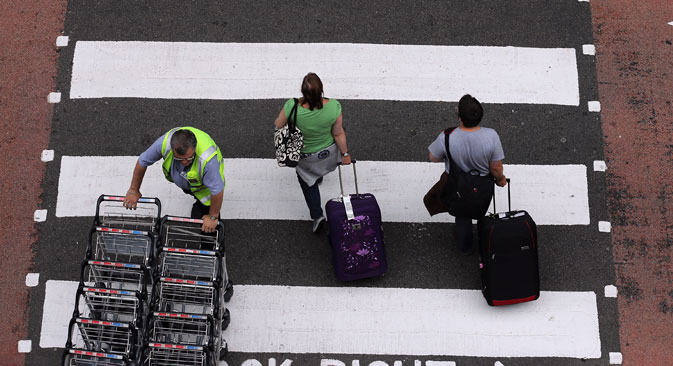
Moscow VS London: Safe or dangerous zebra crossing. Source: Getty Images / Fotobank
From the wintery chills of Novosibirsk to the balmy subtropical wonders of Sochi, eight years working in Russia gave me the opportunity to grow from clueless university graduate to professional English teacher, providing much fun and adventure along the way.
It was in Moscow, however, that I felt most comfortable, eventually allowing it to become the place I know best of all in this world; a second home. Despite this, a semi-drunken New Year resolution led to me quit my job, sell most of my worldly possessions and return to my native land in the hopes of surviving here for the foreseeable future. Little did I know how much reverse culture shock would affect me, right down to the nitty-gritty of simply getting around.
Stop, Look, Listen and Think! These wise words, drilled into me as a child by the Green Cross Man, are once again echoing in my 30 year old head as I attempt to cross the streets of London.
My cultural and transport confusion was evident within minutes of being greeted by family members at the airport as I attempted to get in the driver's side door of the car.
Though I should have been more aware of left-hand drive cars, having seen that the further east from Moscow you go, the more likely it is to see cheaply imported cars from Japan, this tiny slip was just a very gentle and harmless warning shot.
When it comes to transport back in one's homeland, it’s time to take things very slowly before even thinking about getting behind the wheel.
Pocketing the phone
Like many others, I became quite adept at safely checking emails, news, messages and Russian social media site VKontakte on my phone whilst walking along the wide, newly re-laid streets, garden boulevards and miles of pedestrian-only areas of Moscow.
This skill, however, seems to have evaporated as I attempt to negotiate the narrow pavements of London. The lesson was brought home to me in an instant when I blithely crossed a road whilst checking a map with a mind-set that has been rewired to check left then right for traffic for nearly a decade. The angry honks of a horn and a blaze of fruity language from one particular driver (a sort of “welcome back” to the world of British swearing) soon set me straight.
Look right then left. Phones should not be used when crossing roads. Lessons (re)learned.
The joy of zebras
Equally entertaining and annoying, Russian drivers tend to display a total lack of care when it comes to following the rules of the road by cutting across several lanes at whim, parking where they like, reversing at great speed and distances along major roads and disregarding the existence of pedestrian crossings.
My daily, death-defying dash across the “safe” zebra crossings of Moscow’s Lomonosovsky Prospekt, a busy six lanes of traffic and two tramlines, I’m glad to say, is a thing of the past. Unlike many of my driving Russian students, whose justification ran, “it is safer not to stop at pedestrian crossing than to stop,” London drivers seem to respect pedestrians enough not to want to mow them down.
Now it’s just a matter of remembering this in order not to hold up London traffic whilst tentatively attempting to cross.
Getting back on the bike
As someone who would like to stay fit and avoid the underground (not to be called “the metro” on any account, I am relearning), it's a good idea to start thinking about cycling as an alternative to walking.
This was not a safe option in Moscow, where the almost total lack of bike lanes - experimented with, but not to any degree of success - means bikes are found on pavements, along with the odd moped and swarms of samokats (push scooters), the summer 2014 craze for kids and adults alike.
This may be something set to change in Moscow, especially with Sberbank and Bank of Moscow bikes (Russian versions of the London mayor's 'Boris bikes') becoming more visible in the city centre as I left. The lack of docking hubs and the general public’s knowledge of riding and driving rules, however, was enough to curb my immediate enthusiasm for them.
I’m keen to give them a try here, however, just as soon as I relearn the delicacies of the right hand turn.
Taxis as they should be
Stumbling back to a friend’s house last Friday after a good British ale drinking session, I found myself itching to stick out my hand and flag down a passing car, something that shocked my friend.
Though officially illegal and slowly being replaced by apps like Yandex Taxi and Get Taxi, nothing in London replicates the gypsy cabs of Moscow.
There’s something special about hailing down a passing car - whether it be a run-down, rusting Lada or cool souped-up BMW with a matt paint job - haggling over a price that rarely exceeds 500 roubles (£8) for wherever you’re going and hurtling round the Golden Ring of Moscow at night. Grandiose 19th century style buildings, Stalin-era skyscrapers, art-deco metro station entrances and imposing, grey soviet blocks all race by; a mini tour of Moscow’s architectural history.
I’ll never quite get that in London, where the traffic runs slower, the buildings tend to be more hidden and the taxi prices crippling.
Riding bikes, getting taxis and crossing roads all seem so universal, and I had no idea of the potential issues I would face with them on my return.
Day by day, however, I shall endeavour to pick back up old habits and, eventually, the Green Cross Man will become a distant memory once more and I shall regain my status as a safe and able British pedestrian.
All rights reserved by Rossiyskaya Gazeta.
Subscribe
to our newsletter!
Get the week's best stories straight to your inbox